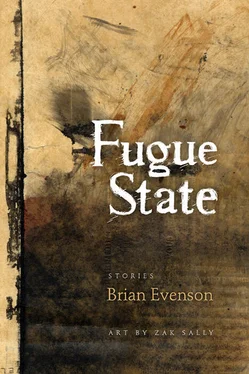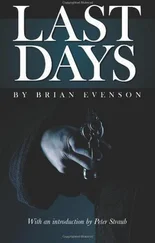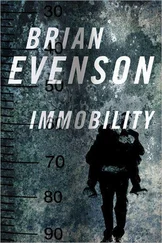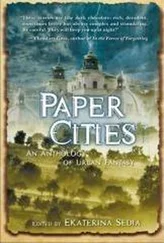The youngest girl, she realized, was asking about the father. Where was he? Wasn’t he coming? Where was he? Why wasn’t he here? The oldest girl just kept patting her back. And where was the mother? the youngest girl wanted to know. Not only where was the father but where was the mother?
“She’s not here,” said the oldest girl.
The youngest girl kept crying and asking questions, which made the oldest girl think that she didn’t really want an answer, or at least didn’t want the real answer. The oldest girl kept patting her sister on the back and waiting for it to be over, waiting for her to calm down. When she finally did, her face was blotched red and her eyes were puffy. She sat in the tents looking drained and not looking at anything at all.
“What do we do?” the youngest girl asked.
“We wait for him to come,” said the oldest girl.
“But what if he doesn’t come?”
“He’ll come,” said the oldest girl.
“But what if he doesn’t?”
“He will,” said the oldest girl firmly.
She crawled out of the tents and got some pillows from their bedrooms. She brought them back into the tents and coaxed her sister into lying down. We’ll just wait, she told her. We’ll just lie down and relax and wait for him to come.
Later, the oldest girl was not sure how long they had stayed there together, waiting, the oldest girl sitting, the youngest girl lying down. The oldest girl watched the youngest girl’s eyes narrow and finally close. Then she kept sitting and watching, the blanket fabric brushing her head lightly. She waited.
When her own head began to nod, she shook it and got up, crawled out of the tents. In the kitchen she checked the clock; it was after eleven, much later than she was allowed to stay up. She looked out the window; there was no moon, the night thick and dark. She could see the dim shape of the porch supports, the ghost of the garage a dozen feet past them, but little more. It was as if the world had dissolved.
She locked the back door, left the front door unlocked so the father could get in. She went around the house, turning lights on. When she was done, she went back into the living room, sat just outside the tents.
She could hear her sister inside the tents, breathing softly. Otherwise the house was quiet. Why not telephone the father? she wondered. But that was the sort of thing the mother would do, the sort of thing, the oldest girl thought, that made the father less dependable. The father, she felt, had to come on his own.
She sat there cross-legged, just outside the tents, guarding her sister, waiting for the father to come. Eventually, he would come, she was sure of it. He would remember them. He would remember her.
And, she thought as her eyes grew heavy, when the father did burst through the door, wild-eyed and unshaven, wearing only his pajama bottoms, she would still be there, she was certain, sitting cross-legged just outside the tents. He would look at her and she would look back, and then she would turn and crawl back into the tents and lay her head down next to her sister’s on the pillow, and sleep. If the father wanted to follow her in, that was fine — there was plenty of room in the tents, and for the mother, too, if she wanted to come. But they would have to understand that in the tents it was the two girls who made the rules. It would be up to the girls now to be in charge, she thought, yawning. It was up to them, not the parents, which meant it was mostly up to the oldest girl. The father would have to understand that.
But if he didn’t come, she finally thought hours later, her legs tingling from being crossed so long, the sky beginning to grow light outside, if he didn’t come, she could learn to live with that too.

And after many days of wandering — days of bitter cold, days in which we wore out what remained of our shoes and then lost toes and then wrapped our feet in rags, days in which we were hard-pressed to decide what wounded and floundering flesh was safe to consume and what must be passed over, days when we passed warily by other tribes of men such as ourselves, days when we were forced to decide whether to haul one another forward or abandon one another along what remained of the roadside — we came at last to a place not utterly undone by devastation. The snow and ice first acquired a different sheen, and then grew slick underfoot, and then began to give way to water and soon was entirely gone. God in his mercy had left it undiscovered and awaiting us, or so we believed at the time.
The feeling returned to our fingers for the first time in many months. There were a dozen dwellings intact and sufficient among the ruins, and we made our way into one to find there the dead huddled together dry and hollow now, their bodies like emptied sacks. We lay them with respect in one of the beds of the house and sealed the room because the living should not hold ground in common with the dead. Then we took, from cabinets and closets, dried goods and cans, and many of these proved still edible, and for the first time in many days we did not have to scrabble for food.
We chose a room and tore the planking from the floor and built just outside the house a fire and slept the sleep of the dead.
But in the morning, we began to recall the dead boarded into the room beside us and began to wonder if we had sinned in our actions against them. Our leader, Hroar, determined that we must show them our respect by aiding them on their way to heaven, and so with the smoldering remnants of our fire we made of their house a pyre and let it burn until the dead were nothing but smoke.
“We must,” Hroar told us, “find a dwelling free of the dead and make of it a dwelling for the living.”
We chose another of the still standing dwellings and entered therein and there too we found the dead, their bodies dry and hollowed out, like emptied sacks. There were nowhere signs of life, only a thin settling of dust over all things. We took from the house all goods and cans and stripped it of what lumber it could spare and still be a pyre, and then commended the dead to God’s notice and set the house aflame.
It proved the same with each dwelling standing, each clotted with the dead. Quickly we learned to approach the window of each dwelling and, seeing the dead, leave them undisturbed. It was Hroar who would have it thus, for, he asked, Why would God have left the town for us to discover if our only purpose was to destroy it? No, he said, if they were not disturbed, the dead would be willing to await their reward.
Thus at the end of the second day we had not found a dwelling to call our own. And when we camped, it was not within a shelter but on open ground, and though the ground was free of ice and we now had food and fuel for fires, many grumbled against Hroar and even suggested that we should merely heap the dead together and burn them all and keep their dwellings for ourselves.
On the third day we awoke to find our faces and hands strangely tender with heat and Hroar himself missing. We huddled together and consulted one another as to what should be done, and might in fact have left that place had we known a place to go. As it was, we clung to each other and sometimes searched through the ruins around us. Here too we found bodies, but not nearly so many, and most of them little more than piles of ash. Here too we saw, on what remained of building walls, strange figures: human in size and shape, but with their limbs and bodies odd and misshapen, as if the shadows of monsters had been torn from them to become immobile and fixed, and this filled us with dread.
Читать дальше













